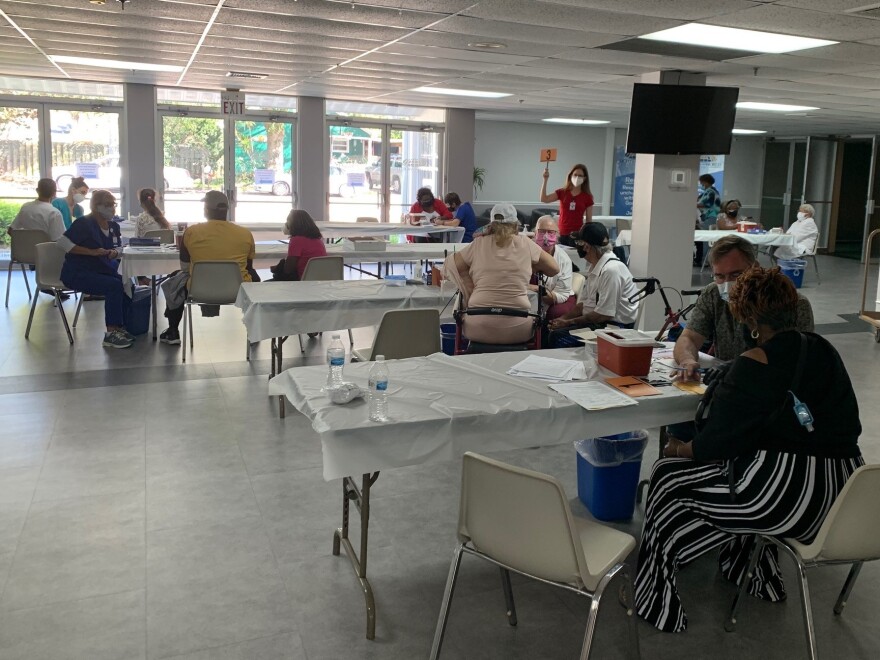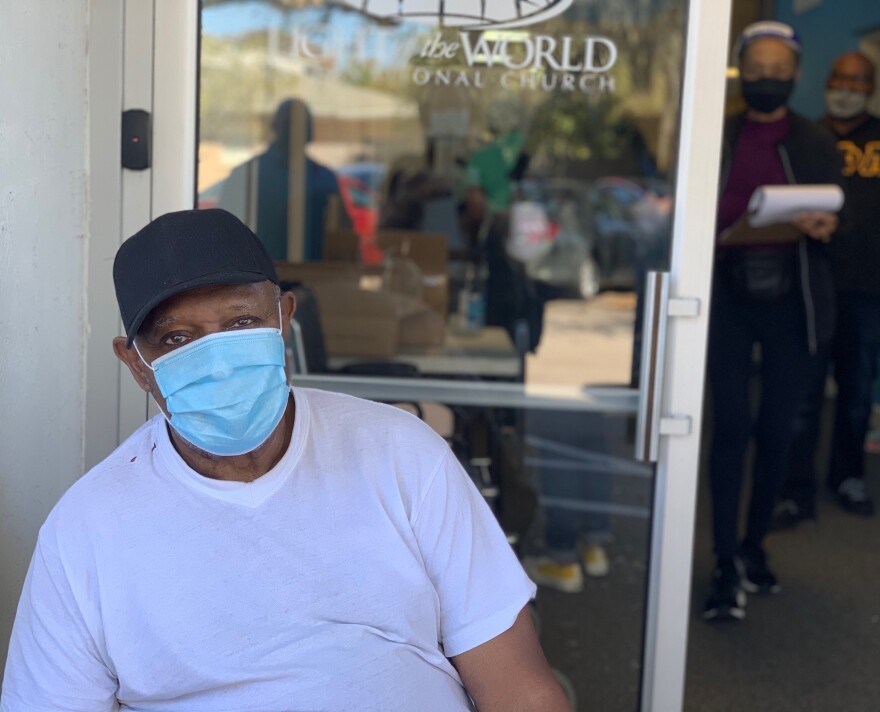Franklin Cochran, 78, sat with his walker outside Light of the World International Church in Sarasota just days after getting hip surgery.
For a few hours last Sunday, the house of worship served a different purpose: a place to vaccinate more than 250 seniors of color against COVID-19.
"I wouldn't miss this," said Cochran, who lives with his wife in the northern part of the county where the church is located, and where a lot of Sarasota's Black residents reside.
“We came out here because we want to live a long time, and this was our best shot right here,” he said.
Prior to the event, more than 71,000 people had been vaccinated in the county. Only 670 — fewer than 1 percent — were Black. Roughly 970 recipients identify as Hispanic.
Hundreds of these residents got their shots at another pop-up clinic hosted by Sarasota Memorial Hospital in January in the Newtown neighborhood.
The numbers suggest the large state- and county-run drive-thru sites aren't serving people of color.
Cochran knows access has been a challenge and said that's why this church site is so important.
“Because Blacks and Hispanics, we catch hell, and that's on every level of society,” he said.
"What's wrong with this picture?"
The event was organized by the Florida Department of Health in Sarasota County and community groups that had been advocating for it for months, like the Multicultural Health Institute and the Sarasota County NAACP.
Dr. Lisa Merritt, executive director of the institute, said people of color are more likely to face barriers to care and have health conditions that put them at greater risk for severe cases of COVID-19. She said the new variants of the virus making their way through the state heighten concerns.
“These people are sitting ducks, particularly those with chronic health conditions over 65 in high-risk ZIP codes,” Merritt said. “They are more susceptible to the complications that will require hospitalization and possibly very aggressive medical maneuvers, and we want to prevent that.”
Black people account for 9 percent of the county's coronavirus hospitalizations, despite making up less than 5 percent of its population.
Trevor Harvey, president of the Sarasota County NAACP, said state leaders don't seem to be taking that into account when distributing vaccines in the region.
“The underserved communities that have been disproportionately impacted the greatest are looking and saying, ‘Well they're having a special event in Lakewood Ranch — what's going on with that? They're having a special event down in Venice with 3,000-plus vaccinations — what's wrong with this picture?’” he said.
Gov. Ron DeSantis helped organize the Lakewood Ranch clinic in neighboring Manatee County. It was exclusive to residents living in two mostly-white ZIP codes with some of the highest income levels and lowest coronavirus rates in the area.
DeSantis is facing national criticism and calls for a federal investigation.
Harvey said the governor's actions sent a powerful message.
“It seems like you're setting these things up in communities who have less issues than communities of color, OK, and to us, that shows racial disparities, that shows classic racism,” he said.
Efforts to improve equity
The need to boost vaccination rates in underserved communities is not lost on Chuck Henry, health officer with the Florida Department of Health in Sarasota County.
Before the event at Light of the World International, Henry said he looked at the county’s vaccination rates for Black residents compared to how many Black seniors lived in the county, and said the numbers suggest about 21 percent had been vaccinated.
“Which surprised me, it’s not bad, but when I compare that to my county as a whole, 35 percent of residents over the age of 65 have been vaccinated, so we have that gap between the 35 and the 21, which is concerning,” Henry said.
The latest state data issued Wednesday afternoon showed 861 Black and 1,134 Hispanic people had been vaccinated in Sarasota, out of nearly 78,000 people total. The rates improved marginally from last weekend.
Henry said the department is working on making its vaccination sites more accessible for people who don’t have transportation and that he wants to do more events like the one at the church as more supplies come in. Advocates say they welcome the partnership.

But Henry said logistics and the pressure to get as many seniors vaccinated as fast as possible complicate things.
“We have about 160,000 citizens over the age of 65, so that's about 37 percent of my population,” he said, adding that the statistic does not factor in “snowbirds” who live in the area part time.
Henry said up until recently, Sarasota was only getting a few thousand doses a week. Those would only last a day or two at the county’s mass vaccination site.
Appointments are handled through an online registration system called Everbridge, which is also used to schedule shots at large pop-up events like recent ones held in Venice and Northport.
People can also call in to register by dialing 941-861-VAXS (8297), but some may not know that.
Merritt said many people of color aren’t signing up with the county. Some lack technology, others haven’t been educated about the process.
Merritt led a meeting Wednesday morning with nonprofits and health officials from Sarasota and Manatee counties to talk about next steps in improving equity in the region.
“We know there's a supply issue, but at the same time, if we're getting 4,000 vaccines in, how do we do better at slicing that off and directing it to areas of highest need that have been underserved throughout this process?” she asked the group.
Merritt said leadership needs to be doing culturally sensitive outreach. Her team is calling people directly and going into neighborhoods with iPads to help them register for vaccines. Some team members speak multiple languages.
She also wants to figure out a way to flag people in the county system who are especially high-risk so they can get protection sooner. A representative with the health department could not say whether that was possible but did say there may be opportunities to identify underserved ZIP codes and do targeted efforts in those areas.
Merritt knows there's a lot of work to do but said there needs to be a greater sense of urgency because for some people it's a matter of life and death.






